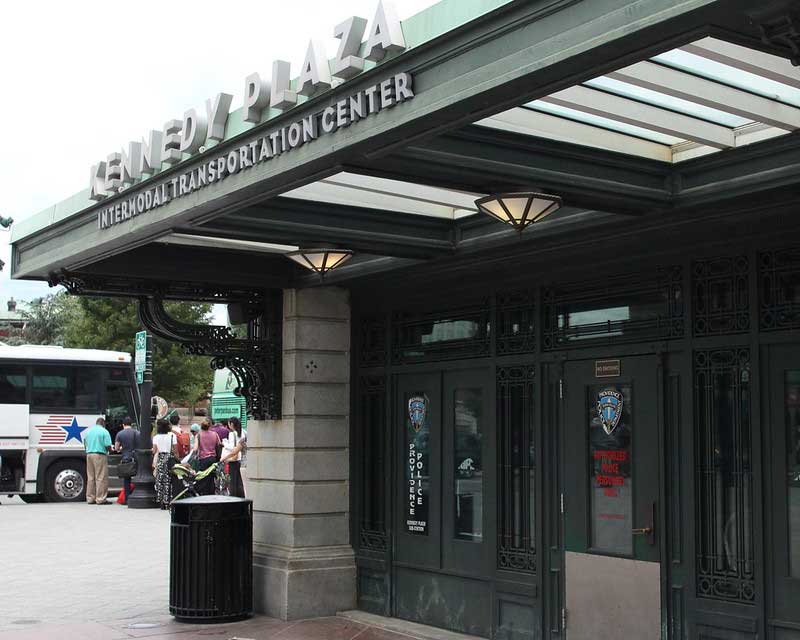
Kennedy Plaza is a lifeline to accessible public transportation for many Providence residents. Yet, until now, no one from the state has asked for their input on a proposed plan that would essentially dismantle this transit hub. Photo: Wil C. Fry/CC-BY-NC-ND-2.0
When I ride public transit, I know I’m a part of a larger community – and so are you. Whether you’re a casual, once-in-a-blue-moon rider, or swap photos of your grandkids with your fellow morning commuters, you belong to this community. And when it comes to the future of public transportation and achieving transportation justice, it’s your voice – the voice of the riders – that needs to be heard.
Those voices have so far been ignored in Providence, however, where a proposal to shut down Kennedy Plaza, a critical transportation center, will have far-reaching impacts on those who rely the most on public transit.
Kennedy Plaza is the busiest transit hub in the state. It serves 36 of Rhode Island’s 39 communities, served more than 13,000 riders in 2020, and averages more than 15,000 weekday boardings. The ridership is diverse, with many riders identifying as Black, Indigenous, and people of color or coming from low-income households.
A proposed plan to essentially dismantle Kennedy Plaza and replace it with multiple different hubs would negatively impact those riders. Despite vocal opposition to the plan, the State remained silent about the proposal for months. But now we finally have an opportunity to make our voices heard.
I use the bus to get everywhere, including to get to work, which takes two buses. Reworking the plaza would lengthen my commute and take away from what I love about Providence – its sense of community.”
Alexander from Providence
First proposed in 2020, the Providence Multi-Hub Bus System was touted as a way to improve public transportation in Providence. Proponents claimed it would connect riders to job opportunities, improve the rider experience with new amenities, and offer expanded services.
The proposed plan would remove several stops from Kennedy Plaza. Instead, it would create several different downtown bus hubs, with some stops moving to existing stations and others to a newly-created station. Effectively, the proposed plan dismantles Kennedy Plaza as it is, requiring riders who rely on the busy transit hub to make, in many cases, longer and more complicated trips to get where they need to go.
As proposed, the plan would make accessing public transit harder for multiple communities with histories of marginalization: the aging, the disabled, low-income households, essential workers, and the unhoused. How much are new amenities worth, then, if the most vulnerable riders have little to no access to them?
Every time [Kennedy Plaza] is made ‘better’ the handicapped and low-income citizens are hurt the most. Please do not make our lives even more difficult.”
Melissa from Warren
The plan was immediately unpopular, and opposition to it has been robust and vocal. In the two years since the multi-hub plan was announced, local, state, and regional organizations have called on the Rhode Island Department of Transportation, the Raimondo administration, and the McKee administration to reject it. Advocates asked instead that the State invest in a robust public participation process that centers riders and their needs. In particular, they highlighted how communities of color and low-income communities rely on Kennedy Plaza staying right where it is.
A Title VI civil rights complaint filed by GrowSmart RI and the South Providence Neighborhood Association went further, stating: “Several transit riders and community stakeholders have asserted that systemic racism has played a role in the decision making for this plan that would result in a lower level and quality of transportation service for transit riders who are a majority-minority population.”
These calls for a transparent public process went unanswered for long months. Despite the Title VI complaint and other advocacy that included Providence City Council Resolution opposing the multi-hub plan, resident petitions, and rider surveys, the state remained silent and failed to make any meaningful progress on working with the public towards a rider-friendly transit plan.
In response to that silence, the Kennedy Plaza Resiliency Coalition was formed in January 2021 to bring together the diverse stakeholder groups representing plaza users. Specifically, the Coalition gives a voice to individuals, communities, and organizations in opposition to the proposed Multi-Hub Bus System.
Please don’t move [Kennedy Plaza]. I am disabled and rely on [Rhode Island Public Transit Authority]. Please! Please! Don’t move Kennedy Plaza.”
Michael K.
When it comes to the harm this proposed transit system will inflict, I think Dwayne Keys, head of the South Providence Neighborhood Association, a member of the Resiliency Coalition, has said it best: “This is about a person being able to get to work on time and keep their job…. This is about people who have medical appointments that need to get to their places on time to get the care that they need. This is about people with disabilities, who, if you look at [Kennedy Plaza], this location is the ultimate accommodation that they need for their lives. And overall, all those who use the bus to get where they need to go…. The majority of the riders are black indigenous people of color, low to moderate income and working families…. This is not just some simple transit plan. There are underlying reasons for removing those who they do not want in this area. This process and this plan itself is the epitome of oppression, exclusion, elitism, classism and yes, racism.”
It’s not just riders who will be hurt by this proposed plan. Kennedy Plaza is also a critical hub for Providence’s unhoused population, who rely on its public restrooms for personal hygiene. If the multi-hub plan moves forward, it could mean the permanent closure of those facilities. We already saw the disruption caused by the temporary closure – and the delayed re-opening – of the facilities during the height of the pandemic. Bus drivers, riders, and the unhoused were unable to even wash their hands regularly let alone take care of other hygiene needs to ward off infection. A permanent closure of those facilities would create an unnecessary public health risk.
My dad is 84 years old and uses a cane. To move these bus stops is a real bad idea and isn’t fair to old people using canes and wheelchairs.”
Allen from Providence
This is where you come in.
Public participation in government is one of the most effective ways to bring about change in your community. Of course, for this to be realized, your government must provide avenues for your input. And so, having faced almost two years of advocacy opposing the multi-hub plan, the Rhode Island Department of Transportation and Public Transit Authority are holding public meetings to discuss “proposed changes to bus service in downtown Providence.”
It is a victory, in and of itself, that the multi-hub plan is not mentioned anywhere in RIPTA’s statement on the public meetings – a victory after long months of silence from the state agencies. But it is not enough.
Stop the multi-hub. You don’t have to ride buses, so you don’t understand the struggle. [It’s] just going to create a mess and make it more difficult for us that do ride the bus.”
Yanika V.
When we think about justice – environmental justice, transportation justice, procedural justice – words like fairness, equity, and accessibility come to mind. Riders must be centered in conversations about public transportation, and these conversations must happen at the outset of a plan or project – not when other entities are ready to break ground.
Collaboration with riders must be transparent and consistent. We know what we as riders want: bus shelters to protect from severe weather, transit that is ADA-accessible, good lighting, clear signage, and restrooms and waiting areas that allow riders dignity and safety. It’s time to let Rhode Island transit officials know that these amenities are the floor, not the ceiling.
The next public meetings will be held on March 8 (virtually) and March 21 (in person). If you are a rider in Rhode Island and are concerned about rider voices being heard in a conversation about potentially dismantling the biggest transit hub in the state, please log-on on March 8 and give your comments.
Details on participating online and submitting written comments can be found here.
The quotes used in this blog post are from bus riders at Kennedy Plaza and were collected during the Rhode Island Organizing Project’s postcard campaign in the summer of 2021.


